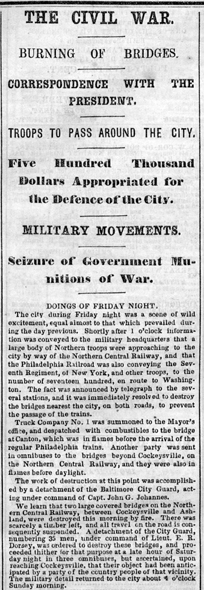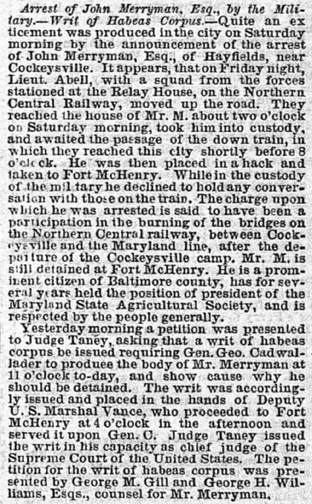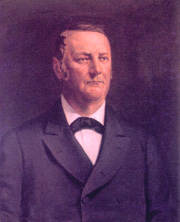Straddling Secession: Thomas Holliday Hicks and the Beginning of the Civil War in Maryland
- Hicks Exhibit Home
- The Gathering Storm
- Baltimore and Annapolis
- Calling the Legislature
- Burning the Bridges
- A Plot Aganist Lincoln?
- The War After Hicks
Burning the Bridges

View Enlarged American, and Commercial Advertiser (Baltimore) April 22, 1861 MSA SC 4104-1-2
Following the Baltimore riots, Hicks and Baltimore Mayor George William Brown urged President Lincoln not to send any more troops through Baltimore, saying they feared additional violence. Brown wrote, "it is my solemn duty to inform you that it is not possible for more soldiers to pass through Baltimore unless they fight their way at every step.If they should attempt it, the responsibility for the bloodshed will not rest upon me."
Late on the night of April 19, Hicks, Brown and Police Marshal George P. Kane met and devised a plan to burn all the railroad bridges north of Baltimore to prevent the arrival of more Federal soldiers. During the night, a city militia unit and a group of about sixty Baltimore policemen burned the bridges and cut telegraph lines, isolating the city from the north. Several days later, additional bridges between Cockeysville and the Pennsylvania line were burned by the Baltimore County Horse Guard.
No charges were ever filed for burning the bridges, but John Merryman, a Lieutenant in the Horse Guard and wealthy planter, was arrested by Federal troops on May 25, 1861. Imprisoned at Fort McHenry without charges or trial, Merryman sought to be released by a writ of habeas corpus, but could not as that right had been suspended in Maryland by President Lincoln. Merryman appealed to Roger B. Taney, Chief Justice of the United States Supreme Court, who issued a landmark opinion saying that only Congress could suspend the right of habeas corpus.

View Enlarged The Sun (Baltimore) May 27, 1861 MSA SC 2852-1-105
Merryman ultimately was not released from Federal custody until much later. After the war, like many suspected secessionists who had been arrested, Merryman became a prominent political figure. He served as state treasurer from 1870 to 1872, and represented Baltimore County in the House of Delegates from 1874 until 1876.
The General Assembly later investigated who was responsible for ordering that the bridges be burned. Brown, Kane and former Governor Enoch Louis Lowe, also present at the meeting, all blamed the governor. Hicks claimed that he "left the whole matter in the hands of the Mayor," and said the governor had no authority to issue such an order, anyway. In reality, if Hicks did give the order, he did so with the full approval of the others at the meeting. Kane and Brown later were arrested by Federal troops for disloyalty to the Union, and Lowe left Maryland for the Confederacy.

John Merryman
Meredith Janvier, 1912
Oil on canvas
MSA SC 1545-1197
Hicks' own loyalty was never questioned officially, although rumors circulated as to where his own sympathies truly lay-with the Union, the Confederacy, or with Maryland.
|
This web site is presented for reference purposes under the doctrine of fair use. When this material is used, in whole or in part, proper citation and credit must be attributed to the Maryland State Archives. PLEASE NOTE: The site may contain material from other sources which may be under copyright. Rights assessment, and full originating source citation, is the responsibility of the user. |
© Copyright December 15, 2023 Maryland State Archives
